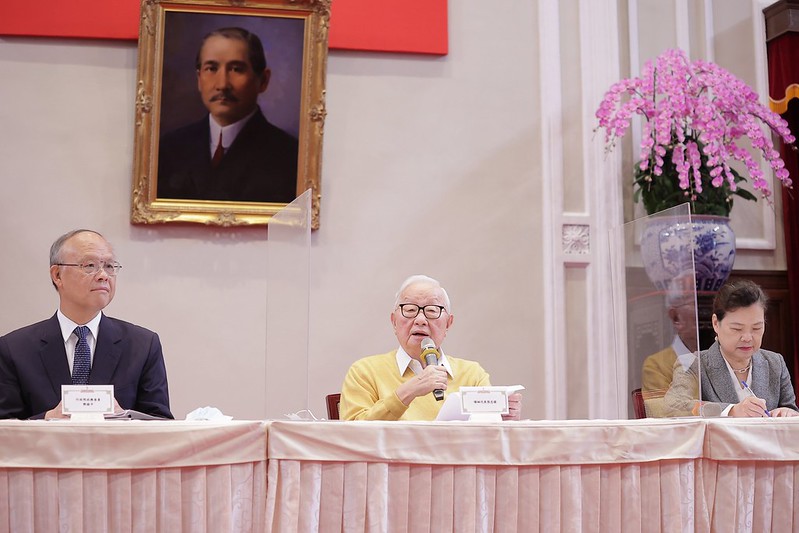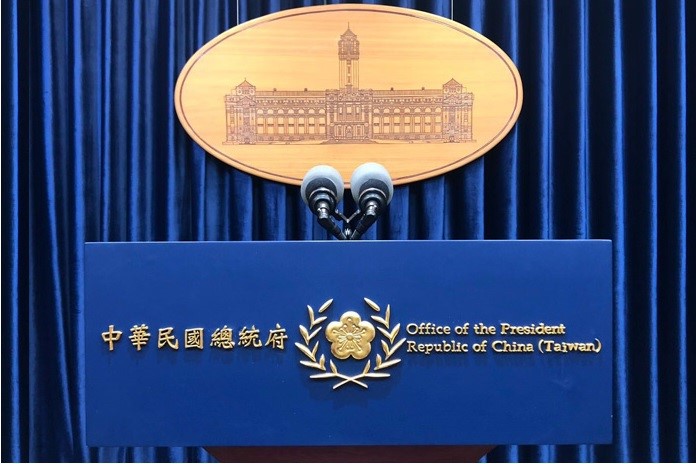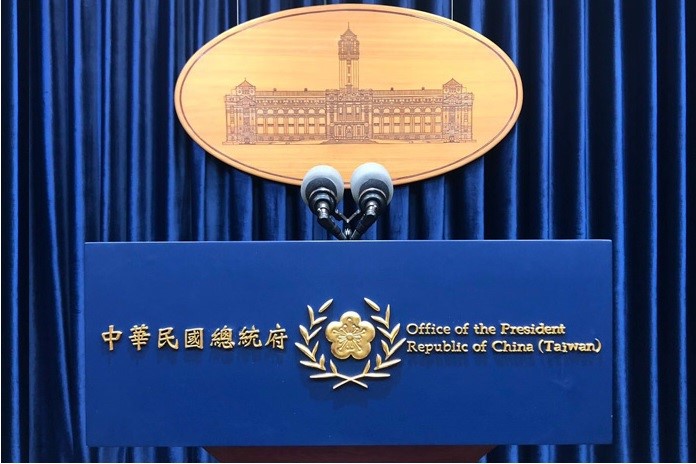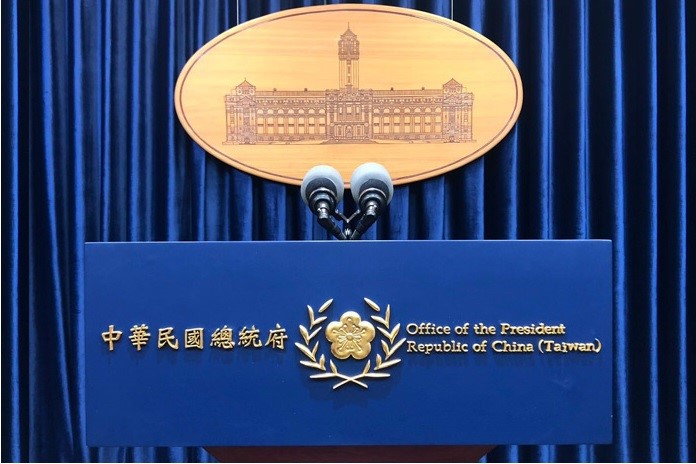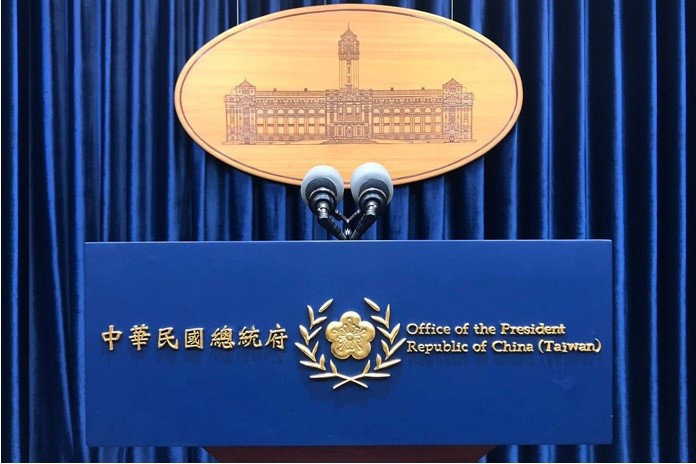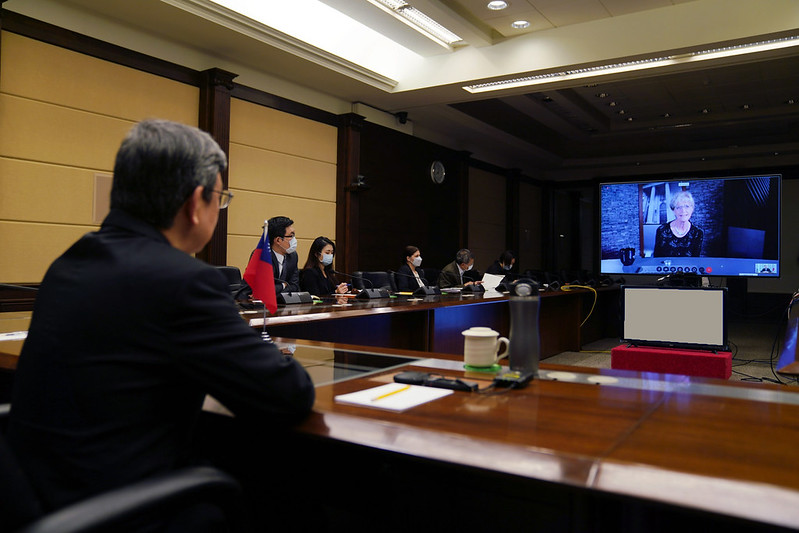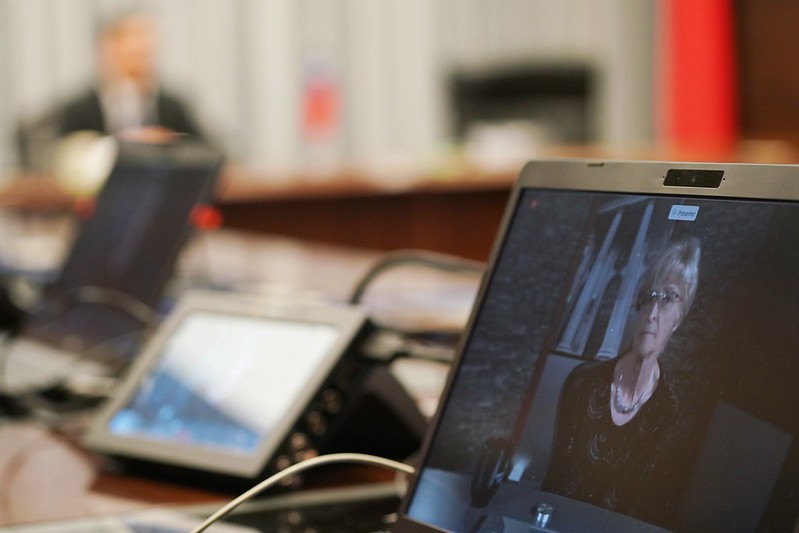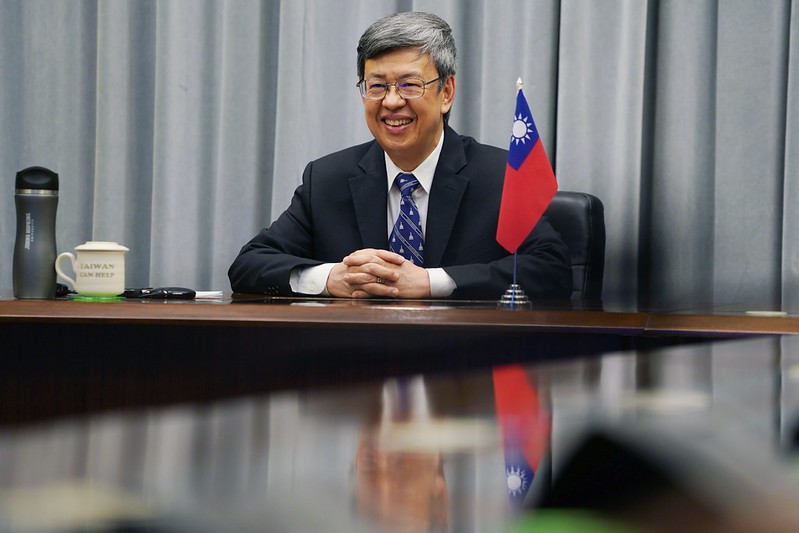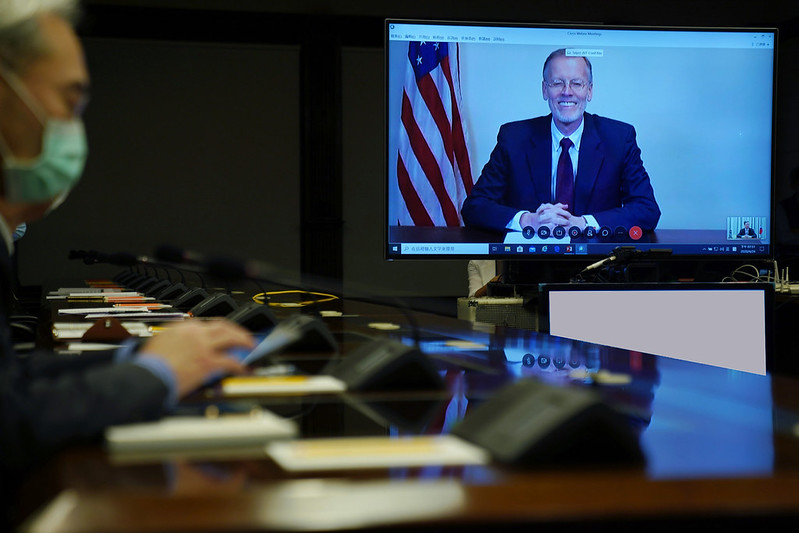News & activities
 News releases
News releases
Speaking from the Presidential Office yesterday evening, Vice President Chen Chien-jen participated in a videoconference at the invitation of the Johns Hopkins Bloomberg School of Public Health, joined by Bloomberg School Dean Ellen J. MacKenzie and American Institute in Taiwan (AIT) Taipei Office Director Brent Christensen.
With Dean MacKenzie as program host and Director Christensen acting as moderator, Vice President Chen delivered a speech entitled "Taiwan Model: Response to COVID-19" and responded to questions from Dean MacKenzie.
The following is a summary of the videoconference proceedings:
Thank you very much Dean MacKenzie and Director Christensen. It is my pleasure and honor to share Taiwan's response to COVID-19 with you.
The Taiwan Centers for Disease Control (Taiwan CDC) learned from online sources that at least seven atypical pneumonia cases were reported in Wuhan on December 31 last year, so we immediately sent reporting e-mails to inform the WHO and Chinese Center for Disease Control and Prevention (China CDC). We considered the clustering of atypical pneumonia cases in Wuhan to be a serious, sudden, unusual, and accidental event which required immediate attention and action by the WHO and the China CDC.
We have embedded the concepts of prudent action, rapid response, and early deployment into our epidemic prevention system. We started on-board quarantine of passengers on direct flights from Wuhan. We strengthened the suspected case reporting and hospital infection control of the healthcare system in Taiwan on January 2. An Advisory Committee on Atypical Pneumonia in China was organized on January 5, and a Level 1 travel notice for Wuhan was announced on January 7 when the causal agent of the new disease was named 2019-nCoV by the WHO.
The emerging infectious disease was announced as a Class 5 Infectious Disease by Taiwan's CDC on January 15, to give a warning to all healthcare institutions and the general public when the WHO and China's CDC claimed limited human-to-human transmission of 2019-nCoV. We activated our Central Epidemic Command Center (CECC) on January 20. President Tsai Ing-wen held an Emergency Meeting of our National Security Council to integrate and coordinate inter-ministry efforts for the containment of the COVID-19 outbreak, financial relief, and economic stimulus.
Our rapid response to COVID-19 is based on experiences in the containment of SARS in 2003 and the H1N1 pandemic flu in 2009. Our strategies include optimal border quarantine, enforcement of 14-day home isolation/quarantine, mobilization of the healthcare system for infectious diseases, adequate supply of PPEs and other medical materials, and the rapid announcement of travel alerts and warnings.
We held daily CECC press conferences to provide transparent information, health education, and risk management. We encouraged people to maintain appropriate social distance and avoid large-scale gatherings. Financial relief and economic stimulus are also essential in the effort to contain the COVID-19 outbreak. We are collaborating with the USA and European countries to develop rapid diagnostics, antivirals, and vaccines. Last but not the least is international collaboration. No country can fight against COVID-19 alone. We cannot stand by when many countries are in crisis.
Since the first case was confirmed on January 21 in Taiwan, as of April 24, there were 428 confirmed cases and 6 deaths. Among confirmed cases, 55 are indigenous; 343 are imported; 30 are Navy fleet members. The surveillance data of COVID-19 is shown on the diagram on the left; more than 59,000 reported suspected cases were tested. The epidemic curve is shown on the diagram on the right. The first small peak in late January included cases from China, and most cases in the second peak in mid-March were imported from Europe and the USA.
This timeline shows the measures of border control in Taiwan. Our CECC raised the travel notice for Wuhan to Level 3 on January 21 and for all countries on March 21. Temporary prohibition from entering Taiwan was implemented for Chinese nationals on February 6, Hong Kong and Macao on February 11, and all countries on March 19.
We implemented a series of quarantine measures for inbound travelers, which include health checks and quarantine hotel booking before boarding, onboard quarantine and health statements, home quarantine notices using mobile phones, fever screening and symptom checks at the airport and home, designated taxis or rental cars for local transportation, as well as home or hotel quarantine for 14 days.
All inbound travelers are subject to home quarantine for 14 days after entering Taiwan, while close contacts of confirmed cases are isolated at home for 14 days. They are requested to stay at home or a designated place. Local civil and health officers actively monitor quarantined and isolated persons once or twice a day. We use an electronic security monitoring system to track the location and health status of people subject to home quarantine or isolation.
We apply innovative technology to implement several home quarantine/isolation-related systems. The Quarantine System for Entry is used to report personal TOCC, i.e., travel history, occupation, contact history and clustering; the Home Quarantine Tracking System is used to provide care and support to quarantined or isolated persons; the Line Bot System, called the "Disease Containment Expert," is used to report personal health status and request medical consultation and healthcare services; and the Digital Fencing Tracking System works to alert those leaving the range of quarantine/isolation.
We provide a series of care and support services to persons in home quarantine or isolation by local governments. The services include a 24/7 hotline for consultation, family visits, meal delivery, garbage collection, and support for settlement as well as healthcare arrangements. Quarantined persons with suspected symptoms are sent to a designated hospital by ambulance, while medical care is arranged for those with non-suspected symptoms.
The CECC announced social distancing measures on April 1 to encourage the general public to maintain social distance. People are requested to keep a person-to-person distance of 1.5 meters indoors and 1 meter outdoors. People are also encouraged to wear masks in crowded areas. Reduction in person flow in temples, national parks, hotels, night markets, and shopping areas is also recommended.
This slide shows how the general public voluntarily practices social distancing. People keep a distance from each other in public transportation stations, primary school students and food court customers eat together using a clapboard or plastic board, and people wait in a queue for takeaway.
We have organized a national mask team to expand 92 production lines for manufacturing face masks and requisitioned a total of 73 manufacturing companies, as of April 16. The average daily production of surgical face masks has increased from 1.9 million in January to 16 million in April through integrating raw materials, machines, and production lines, as well as ensuring a stable power supply.
In addition to increasing mask production, we allocate masks to every citizen using National Health Insurance cards to allow individuals to purchase masks at pharmacies. An online name-based distribution system has also been implemented for people to order online, pay by credit card/ATM, and get masks at over 10,000 convenient stores, such as 7-11 or FamilyMart.
We arranged charter flights to evacuate Taiwanese citizens from Wuhan, China and Yokohama, Japan. When they arrived in Taiwan, they were required to disinfect their hands and carry-on baggage, and undergo fever screening and a health assessment. When the passengers had symptoms, an ambulance was arranged to send them to a hospital for further examination. Passengers with two negative test results were sent for group quarantine by bus. All luggage, aircraft, buses, and ambulances were disinfected. More than 1,400 evacuees have returned to Taiwan safely.
We donated over 17 million surgical masks in April to the United States, European countries, Japan, and diplomatic allies to support medical personnel in containing COVID-19. We are also collaborating with the USA and EU countries to develop rapid diagnostics, antivirals, and vaccines. Together, we are helping each other to contain COVID-19 around the world.
President Tsai convened a high-level national security meeting on March 12 and announced proactive measures to boost Taiwan's economic momentum and vitality. We allocated a budget of NT$1.05 trillion for epidemic control, financial relief, and economic vitality; shifted spending priorities to emergency measures; increased government investments and procurement to expand domestic demand; accelerated private investment and maintained foreign exchange market stability and stock market momentum.
Taiwan's response to contain the COVID-19 pandemic has been widely recognized for its rapid mobilization, swift decision-making, thorough implementation, coordinated resource distribution, transparent information, and use of advanced technology. Taiwan is willing to share its experiences with other countries and continue to support medical personnel in seriously affected countries. I would like to assure everyone that "Taiwan can help! Taiwan is helping!" and is answering an urgent call for greater international cooperation.
In her remarks, Dean MacKenzie said that the Bloomberg School of Public Health and Taiwan have a long history of close cooperation, and she was very happy to invite Vice President Chen to share Taiwan's disease prevention experiences via videoconference.
Dean MacKenzie noted that Vice President Chen graduated from Johns Hopkins University's Bloomberg School of Public Health with a Doctor of Science degree in epidemiology and human genetics, and he has made many contributions in academia, public health, scientific research, and government. He has also used his expertise in public health to help fight the 2003 SARS outbreak and the coronavirus disease 2019 (COVID-19) pandemic, she said.
In his remarks, Director Christensen said that the United States and Taiwan issued a joint statement a few weeks ago pledging to strengthen cooperation to prevent the spread of COVID-19. Especially in times like these, he said, cooperation gives US-Taiwan relations a new significance, and as US Secretary of State Mike Pompeo recently said in a Tweet, "During tough times, real friends stick together."
Director Christensen stated that the "Taiwan Model" for preventing the spread of COVID-19 is an example that countries around the world can learn from, and Taiwan has actively used its own experience and capabilities to help others. He then cited Taiwan's donation of face masks to countries worldwide facing shortages of surgical face masks to protect frontline medical personnel, including the US.
Director Christensen also said that the videoconference would show that Taiwan is a reliable cooperative partner that can share its professional knowledge and resources with governments, universities, and public health agencies in countries around the world. The United States, he said, hopes to cooperate with Taiwan and work together to promote the Taiwan Model for fighting pandemics. In an article in the April 16 edition of Time magazine, President Tsai Ing-wen said that Taiwan's success is "no coincidence," and that the most fundamental element of that model is transparency, both toward the Taiwan public and the international community. Director Christensen expressed his belief that the Taiwan Model is the world's most effective model and the product of a democratic system.
